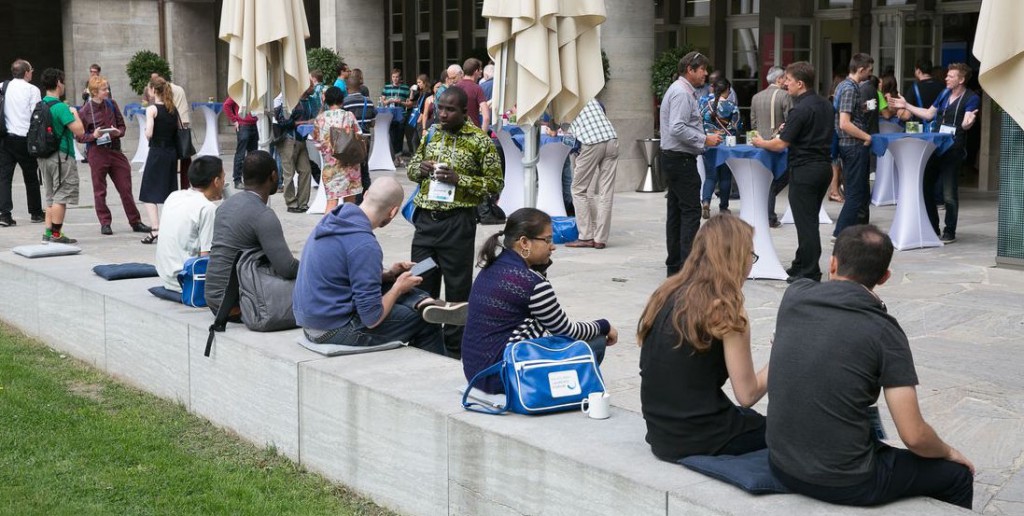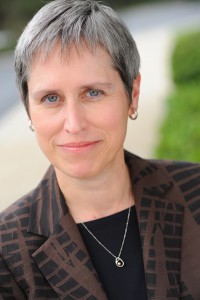Stepping Off the “Innovation” Bandwagon

Rosalind Reid, guest blogger at HLF15: I believe I’ve heard the word “innovation” spoken only once during the 2015 Heidelberg Laureate Forum. For an event that gathers together the inventors of today’s computing and the inventors of tomorrow’s, this is remarkable—and refreshing.
Here at HLF, the pressures of the marketplace—where glib terms like “innovation” dominate—feel fairly distant.
Most of the laureates attending this year are winners of the Association for Computing Machinery’s Turing Award, and many Turing winners have done their important work in industry. A significant number of the young computer science researchers here, and their colleagues in mathematics, will do the same. But this event celebrates the individual, not the enterprise. The HLF offers an opportunity for young researchers working in rapidly developing fields to view their individual work through a special lens: the unique historical, philosophical and personal context that the elders who laid the groundwork for those fields can provide. In hallways and beer gardens, the younger researchers also share and compare their work with one another.
Here are a few notes from an observer who has been privileged to tag along with these young researchers as they navigated those hallways, buffet lines and bus excursions.
***
That single use of “innovation” stuck in my mind. And so I wondered: If not the chance to innovate, what is the thread that ties together the HLF generations, separated by a half-century and multiple eras in the history of their field?
First, clearly the distinctive work the laureates have done, and so much of the work the young researchers at HLF are doing now, is hard. Throughout the forum, young researchers have had ample opportunity to learn just how hard was the work of the pioneers and how myriad the problems they faced. The reverse is also true. I have not yet heard a laureate suggest that the work of the current generation of researchers is any less hard, less daunting or complex.
In speaking with one graduate student, I wondered also whether the nature of computer science research today is different. I asked aloud how it felt to be working in a maturing, growing, now-established field rather than inventing a new one. Did he envy the excitement of the heady early days of computer science?
Very gently, my young companion deflected the question and set me straight. A young computer scientist today, he noted, has no reason not to think that she too is participating in the creation of an entirely new field of study. How right he was. How do we know that artificial intelligence, quantum computing or cyber-physical systems will not revolutionize human civilization more powerfully than the personal computer, Internet and cell phone?
If I have a wish for these bright young researchers as they return to their work around the globe, it might be that they ignore those who offer recipes for “innovation.” Around the lunch tables and over coffee, they were hatching their own recipes and finding the motivation to go home and try them, perhaps in collaborations they will hatch with far-flung young colleagues. I imagine some will return home discouraged by the vastness of the broad mathematical and technical landscape laid out at HLF, and the pure difficulty of the open questions the senior researchers described in sweeping presentations. But at the Thursday poster session, the energy and confidence was infectious.
The metaphor of the black box was used frequently this week. I’m pretty confident that each attendee’s inner “black box”—that portion of computing that is mysterious and hidden to him—has been shrunk over the course of HLF through conversation, challenge and reflection. I look forward to the computing technologies, and indeed entire new fields, that these young researchers will create. No matter what the marketplace calls them.
 Rosalind Reid (@rosreid) is Executive Director of the US-based Council for the Advancement of Science Writing. Trained in journalism and public policy sciences, she was Editor of American Scientist, the interdisciplinary magazine of Sigma Xi, The Scientific Research Society, from 1992 to 2008. Co-organizer of the MIT/Harvard Image and Meaning workshop series on visual communication of science, she was the first Journalist in Residence at the Kavli Institute of Theoretical Physics at the University of California, Santa Barbara. She served as Executive Director of the Harvard Initiative in Innovative Computing 2008-10 and then Executive Director of the Institute for Applied Computational Science at Harvard’s School of Engineering and Applied Sciences 2010-13. She is a member of the National Association of Science Writers, has served on awards committees for the National Science Board and American Institute of Physics, is an honorary member of Sigma Xi and continues her affiliation with the Harvard computer science faculty as a Fellow.
Rosalind Reid (@rosreid) is Executive Director of the US-based Council for the Advancement of Science Writing. Trained in journalism and public policy sciences, she was Editor of American Scientist, the interdisciplinary magazine of Sigma Xi, The Scientific Research Society, from 1992 to 2008. Co-organizer of the MIT/Harvard Image and Meaning workshop series on visual communication of science, she was the first Journalist in Residence at the Kavli Institute of Theoretical Physics at the University of California, Santa Barbara. She served as Executive Director of the Harvard Initiative in Innovative Computing 2008-10 and then Executive Director of the Institute for Applied Computational Science at Harvard’s School of Engineering and Applied Sciences 2010-13. She is a member of the National Association of Science Writers, has served on awards committees for the National Science Board and American Institute of Physics, is an honorary member of Sigma Xi and continues her affiliation with the Harvard computer science faculty as a Fellow.

